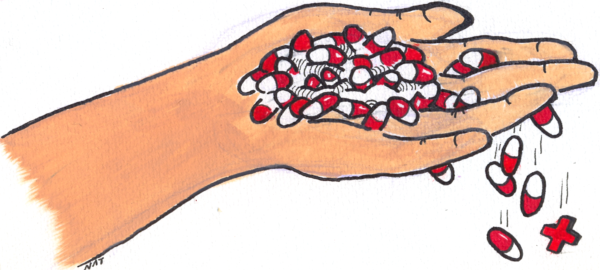
Graphic by Nat Inez, Graphics Contributor
On Aug. 29, the B.C. government launched a class-action lawsuit against 40 manufacturers of opioid-based medications.
Largely reminiscent of class-action lawsuits against tobacco companies in the 90s, B.C. Attorney-General David Eby announced that the lawsuit is being launched in an attempt to address the “corporate corruption and negligence” of drug manufacturers that the government believes undergirds the current overdose crisis. The government is also hoping to recoup the significant “costs” that have been incurred by the province in treating the spike in overdoses and overdose-related death.
At the end of the day, for those that have died from overdose (and for the friends and families of those people), the true “costs” of the overdose crisis — the human costs — can never be recouped. And the fact is the B.C. Government, regardless of the political party in power, has been ignoring this crisis — a leading cause of death among young people in the province — for decades. The Vancouver Area Network of Drug Users (VANDU) has been bringing awareness to this issue for decades, and most of their lobbying efforts have largely gone unacknowledged by the provincial government.
Blaming drug manufacturers for the overdose crisis is merely scapegoating, and glosses over significant structural problems in our society that have contributed to this crisis.
The lack of action on issues that face drug-using populations sends the clear message that the only “cost” the B.C. government supposedly cares about is financial cost, and they could really care less about those that are actually dying in this crisis. But the lawsuit against drug manufacturers doesn’t make all that much sense from a fiscal standpoint either. It’s a frivolous waste of public resources that could be better spent on immediate measures that are actually proven to be effective solutions to drug and overdose-related costs to the public health system.
These types of cost-saving programs are numerous: syringe exchange programs, methadone replacement therapy, heroin replacement therapy, safe-injection and harm reduction sites, Naloxone training programs, detox programs, mobile overdose-response teams, and so many more. And that’s not even counting the costs that could be saved in the legal system by decriminalizing or even legalizing illicit drugs.
The lack of action on issues that face drug-using populations sends the clear message that the only “cost” the B.C. government supposedly cares about is financial cost.
Many organizations that work with drug-using populations on the frontlines recommend the implementation of these kinds of approaches, particularly in the treatment of addictions. Portugal was one of the first countries to decriminalize illicit drugs in 2001 and approach addictions treatment from a public-health-first perspective. Since decriminalization, rates of HIV and Hepatitis C among injection-drug-using populations has fallen dramatically. Closer to home, programs like InSite — Canada’s first safe-injection site established in 2003 — have been hugely successful. In 2017 alone, InSite was visited 175 464 times, and of 2151 overdose interventions by their care team, not a single incident resulted in death. Meanwhile, the grassroots Moss Park overdose prevention and harm reduction site in Toronto successfully reversed 261 overdoses between August 2017 and July 2018.
Blaming drug manufacturers for the overdose crisis is merely scapegoating, and glosses over significant structural problems in our society that have contributed to this crisis; problems like lack of access to general and mental health resources, socioeconomic and racial inequalities resulting from a colonial, neoliberal, capitalist economy, and flawed government and prohibitive drug policies. Implementing and supporting these kinds of programs would start addressing these issues and saving lives immediately. But so long as the government remains focused on launching an expensive (and potentially fruitless) lawsuit — which is really nothing more than a blatant PR move designed to galvanize political support among voter bases — people will continue to die needlessly.







